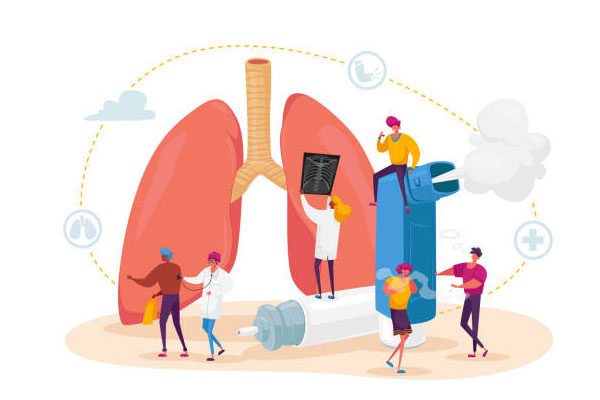Discover effective strategies for managing chronic respiratory conditions Learn about lifestyle changes, medications, therapies, and valuable resources to improve your quality of life
Introduction to Managing Chronic Respiratory Conditions
Understanding the Significance of Chronic Respiratory Conditions
Chronic respiratory conditions, such as asthma, chronic obstructive pulmonary disease (COPD), and interstitial lung disease, can significantly impact an individual's quality of life. These conditions are characterized by persistent breathing difficulties and may worsen over time, making effective management essential for patients.
Prevalence and Impact
Chronic respiratory conditions are common worldwide and affect people of all ages. They can lead to symptoms like shortness of breath, coughing, and fatigue, which can limit one's ability to engage in daily activities and reduce overall well-being. Understanding their prevalence and impact is crucial for both patients and healthcare providers.
The Role of Early Detection
Early detection and diagnosis play a pivotal role in managing chronic respiratory conditions effectively. Timely identification allows for the initiation of appropriate treatment strategies, which can help slow the progression of the disease and alleviate symptoms. Patients should be aware of the importance of early diagnosis and regular check-ups.
The Goal of Effective Management
The primary goal of managing chronic respiratory conditions is to achieve symptom control, improve lung function, and enhance the patient's overall quality of life. This can be achieved through a combination of lifestyle changes, medications, and medical interventions. In this article, we will explore the various aspects of managing these conditions comprehensively.

Understanding Chronic Respiratory Conditions
What Are Chronic Respiratory Conditions?
Chronic respiratory conditions are long-term diseases that affect the respiratory system, which includes the airways, lungs, and other structures involved in breathing. These conditions typically last for an extended period and often worsen over time. They can significantly impact a person's ability to breathe comfortably and lead to various symptoms such as shortness of breath, wheezing, and coughing.
Common Types of Chronic Respiratory Conditions
Chronic respiratory conditions encompass a wide range of diseases. Some of the most common types include:
- Asthma: Asthma is characterized by airway inflammation and bronchoconstriction, leading to recurrent episodes of wheezing, coughing, and shortness of breath.
- Chronic Obstructive Pulmonary Disease (COPD): COPD includes chronic bronchitis and emphysema and is characterized by airflow limitation, resulting in breathing difficulties.
- Interstitial Lung Disease (ILD): ILD comprises various disorders that affect the lung's interstitium, leading to scarring and reduced lung function.
- Cystic Fibrosis: Cystic fibrosis is a genetic disorder that causes the production of thick mucus in the respiratory and digestive systems, leading to lung infections and breathing problems.
Understanding the specific type of chronic respiratory condition is crucial for tailoring the management approach to each patient's needs. Each condition may require different treatments and strategies for effective management.
Impact on Daily Life
Chronic respiratory conditions can have a profound impact on an individual's daily life. Patients often experience limitations in physical activities, reduced ability to work, and diminished overall quality of life. Understanding the challenges and potential limitations imposed by these conditions is essential to provide appropriate care and support.
The Chronic Nature of These Conditions
What distinguishes chronic respiratory conditions from acute respiratory illnesses is their persistent and long-lasting nature. Unlike a common cold or seasonal flu, chronic conditions require ongoing management and may not have a complete cure. This makes it imperative for patients to develop strategies for coping with their conditions and improving their long-term outlook.
Diagnosis and Evaluation
Importance of Early Diagnosis
Early diagnosis of chronic respiratory conditions is critical for several reasons:
- Timely Intervention: Detecting these conditions in their early stages allows for timely intervention, which can slow the progression of the disease and improve the long-term prognosis.
- Symptom Management: Early diagnosis enables healthcare providers to better manage and alleviate symptoms, improving the patient's quality of life.
- Prevention of Complications: Identifying chronic respiratory conditions early can help prevent or reduce complications, such as severe exacerbations and irreversible lung damage.
Diagnostic Tests for Chronic Respiratory Conditions
Healthcare providers use a range of diagnostic tests and procedures to diagnose chronic respiratory conditions. Some of the most common tests include:
- Spirometry: Spirometry measures lung function by assessing how much air you can inhale and exhale, and how quickly you can do it. It's often used to diagnose conditions like asthma and COPD.
- Chest X-rays: X-rays can reveal structural abnormalities in the lungs, helping to diagnose conditions like pneumonia and lung cancer.
- CT Scans: Computed tomography (CT) scans provide detailed images of the lungs and are valuable for diagnosing conditions like interstitial lung disease.
- Arterial Blood Gas (ABG) Test: ABG tests measure the levels of oxygen and carbon dioxide in your blood, helping to assess the efficiency of gas exchange in the lungs.
- Allergy Testing: For conditions like allergic asthma, allergy tests can identify specific triggers that exacerbate symptoms.
Diagnostic testing is typically performed by a healthcare professional and is tailored to the patient's specific symptoms and medical history. Accurate diagnosis is the foundation for effective management.
Consulting a Healthcare Provider
If you experience persistent respiratory symptoms, it's crucial to seek the expertise of a healthcare provider, such as a pulmonologist or allergist. They can perform the necessary evaluations, recommend appropriate tests, and provide guidance on managing chronic respiratory conditions. Regular follow-up appointments are essential to monitor the condition's progression and adjust the treatment plan as needed.
Lifestyle Changes for Managing Chronic Respiratory Conditions
Diet and Nutrition
Proper nutrition is essential for individuals with chronic respiratory conditions. Consider the following dietary guidelines:
- Anti-Inflammatory Foods: Incorporate anti-inflammatory foods like fruits, vegetables, and fatty fish into your diet to reduce inflammation in the airways.
- Adequate Hydration: Staying well-hydrated helps keep mucus in the airways thin, making it easier to clear and breathe effectively.
- Weight Management: Maintaining a healthy weight can reduce the burden on your respiratory system and improve breathing. Consult a registered dietitian for personalized guidance.
- Limit Trigger Foods: Identify and limit foods that may trigger respiratory symptoms, such as dairy or certain spices, based on your specific sensitivities.
Physical Activity and Exercise
Regular exercise is crucial for managing chronic respiratory conditions. Here's what you should know:
- Aerobic Exercise: Aerobic activities like walking, swimming, and cycling can improve lung function and overall fitness. Start slowly and gradually increase intensity.
- Strength Training: Building strength in your respiratory muscles can enhance breathing capacity. Consult a physical therapist for guidance on appropriate exercises.
- Breathing Techniques: Practicing diaphragmatic breathing can help you breathe more efficiently, reducing the effort required for each breath.
- Know Your Limits: Be mindful of your body's signals and avoid overexertion. Work with a healthcare provider to develop an exercise plan tailored to your condition.
Smoking Cessation
If you are a smoker and have a chronic respiratory condition, quitting smoking is paramount:
- Benefits of Quitting: Quitting smoking can significantly slow the progression of conditions like COPD, reduce exacerbations, and improve lung function.
- Support Resources: Seek assistance from smoking cessation programs, support groups, or your healthcare provider to increase your chances of success.
- Avoid Secondhand Smoke: Steer clear of environments where you might be exposed to secondhand smoke, as it can exacerbate respiratory symptoms.
Managing Stress and Mental Health
Mental health and stress management are integral components of managing chronic respiratory conditions:
- Stress Reduction Techniques: Engage in stress-reduction practices like mindfulness, meditation, or yoga to alleviate anxiety and improve overall well-being.
- Seeking Support: Don't hesitate to reach out to a mental health professional or support groups to address the emotional challenges that often accompany chronic illnesses.
- Quality Sleep: Ensure you get sufficient, restful sleep, as poor sleep can exacerbate symptoms. Consult your healthcare provider if you have sleep-related issues.
Remember that lifestyle changes are a fundamental part of managing chronic respiratory conditions effectively and can significantly improve your quality of life when implemented alongside medical treatments and therapies.
Medications for Chronic Respiratory Conditions
Common Medications Used
Medications are often a cornerstone of managing chronic respiratory conditions. Common medications include:
- Bronchodilators: Bronchodilators help relax and widen the airways, making it easier to breathe. They are commonly used in conditions like asthma and COPD.
- Inhaled Corticosteroids: These medications reduce airway inflammation and are frequently used to manage asthma and moderate to severe COPD.
- Long-Acting Beta-Agonists (LABAs): LABAs work as bronchodilators and are often combined with inhaled corticosteroids for better symptom control.
- Anticholinergics: Anticholinergic medications help relax the airways and are typically used in COPD treatment.
- Biologics: Biologic medications target specific immune system components and are employed in treating severe asthma and certain forms of ILD.
Proper Medication Management
Effective management of medications is crucial for achieving symptom control and preventing exacerbations:
- Adherence to Prescribed Regimens: It's vital to take medications as directed by your healthcare provider. Skipping doses can lead to uncontrolled symptoms.
- Proper Inhaler Technique: Using inhalers correctly ensures that the medication reaches your airways. Ask your healthcare provider for a demonstration if needed.
- Regular Medication Reviews: Schedule regular appointments with your healthcare provider to assess the effectiveness of your medications and make adjustments if necessary.
- Understanding Side Effects: Be aware of potential side effects and report any unusual or severe reactions to your healthcare provider.
Emergency Medications and Action Plans
In some cases, individuals with chronic respiratory conditions may require emergency medications, such as:
- Rescue Inhalers: These provide quick relief during acute symptoms and are essential for individuals with asthma or occasional exacerbations of COPD.
- Oral Corticosteroids: In severe exacerbations, a short course of oral corticosteroids may be prescribed to reduce airway inflammation.
- Oxygen Therapy: For severe cases of low blood oxygen, supplemental oxygen may be necessary and should be used as directed.
It's crucial for individuals with chronic respiratory conditions to have an action plan in place, detailing when to use emergency medications and when to seek immediate medical attention.
Collaboration with Healthcare Providers
Collaborating closely with your healthcare provider is key to successful medication management:
- Regular Check-Ups: Schedule routine appointments to monitor your condition and discuss any concerns or changes in symptoms.
- Open Communication: Maintain open communication with your healthcare provider about your medication's efficacy, side effects, and any difficulties you may encounter.
- Medication Updates: Be prepared for medication adjustments based on your condition's progression, and trust your healthcare provider's expertise in optimizing your treatment plan.
Medications are an integral part of managing chronic respiratory conditions, and working closely with your healthcare provider is essential to ensure the most effective treatment and symptom control.
Medical Treatments and Therapies
Respiratory Therapies
Respiratory therapies play a crucial role in managing chronic respiratory conditions:
- Pulmonary Rehabilitation: Pulmonary rehabilitation programs provide structured exercise, education, and support for individuals with chronic respiratory conditions. They help improve lung function, increase endurance, and enhance the quality of life.
- Chest Physiotherapy: This therapy involves techniques to help clear mucus from the airways, making it easier to breathe. It's often used for conditions like cystic fibrosis and bronchiectasis.
- Breathing Exercises: These exercises can teach individuals how to use their diaphragm effectively, optimize oxygen exchange, and manage breathlessness.
Oxygen Therapy
Oxygen therapy is a vital component of managing chronic respiratory conditions, particularly in cases of low blood oxygen levels:
- Continuous Oxygen: Some individuals may require continuous oxygen therapy, delivered through a nasal cannula or mask, to maintain adequate oxygen levels in the blood.
- Intermittent Oxygen: Others may use oxygen only during activities or sleep, as directed by their healthcare provider.
- Portable Oxygen Concentrators: Portable devices provide flexibility for those who need oxygen on the go.
- Oxygen Safety: It's crucial to use oxygen as prescribed, avoiding open flames and heat sources to prevent accidents.
Surgical Options
In some cases, surgical interventions may be considered for managing chronic respiratory conditions:
- Lung Transplantation: For individuals with end-stage lung disease, lung transplantation may be the only option. This procedure can provide a new lease on life for those eligible.
- Bronchial Thermoplasty: This procedure is used to treat severe asthma by reducing airway smooth muscle through controlled thermal energy application.
- Lung Volume Reduction Surgery (LVRS): LVRS is an option for individuals with severe emphysema, where damaged lung tissue is removed to improve lung function.
Palliative Care and End-of-Life Planning
In advanced stages of certain chronic respiratory conditions, palliative care becomes essential:
- Palliative Care Team: Palliative care specialists focus on improving the patient's comfort, quality of life, and providing emotional support for both the patient and their family.
- End-of-Life Planning: It's crucial for individuals to discuss their end-of-life preferences, including advance directives, with their healthcare providers and loved ones to ensure their wishes are respected.
Collaboration with Healthcare Providers
Collaboration with healthcare providers is key in determining the most suitable treatments and therapies:
- Individualized Treatment Plans: Healthcare providers work with patients to develop personalized treatment plans tailored to their specific condition and needs.
- Regular Assessments: Ongoing assessments help healthcare providers monitor the effectiveness of therapies and make necessary adjustments.
- Patient Education: Patients should actively participate in their treatment decisions, understanding the benefits, risks, and expected outcomes of various therapies.
Medical treatments and therapies are essential components in the management of chronic respiratory conditions. Collaborating with healthcare providers ensures that the most appropriate treatments are chosen to improve patients' quality of life and overall well-being.
Preventing Exacerbations and Complications
Avoiding Triggers
Identifying and avoiding triggers is essential for preventing exacerbations and complications in chronic respiratory conditions:
- Environmental Triggers: Patients with respiratory conditions such as asthma should be aware of environmental triggers like pollen, dust, pet dander, and air pollution. Minimizing exposure can reduce the risk of exacerbations.
- Smoking and Secondhand Smoke: For individuals with respiratory conditions, smoking or exposure to secondhand smoke can be detrimental. Quitting smoking and avoiding smoke-filled environments are vital steps in prevention.
- Respiratory Infections: Practicing good hygiene, getting vaccinated (e.g., flu and pneumonia vaccines), and avoiding sick individuals can help prevent respiratory infections that may worsen symptoms.
- Allergen Control: Managing indoor allergens, such as using allergen-proof covers on pillows and mattresses, can reduce allergy-related exacerbations in conditions like allergic asthma.
Emergency Action Plans
Creating and following an emergency action plan is crucial for managing exacerbations:
- Medication Usage: Emergency action plans detail when and how to use rescue medications like inhalers and oral corticosteroids during acute symptoms.
- Recognizing Warning Signs: Patients are educated to recognize early warning signs of an exacerbation, such as increased shortness of breath or changes in sputum color or volume.
- When to Seek Medical Care: Understanding when to seek immediate medical attention is emphasized, ensuring timely intervention during severe exacerbations.
Regular Medical Check-Ups
Regular medical check-ups are essential to monitor the condition's progress and prevent complications:
- Lung Function Testing: Routine lung function tests, such as spirometry, help assess the effectiveness of treatment and make necessary adjustments.
- Chest X-Rays or CT Scans: Periodic imaging studies can detect structural changes in the lungs or potential complications.
- Medication Reviews: Healthcare providers review medication regimens to ensure they remain effective and make modifications as needed.
- Compliance Assessment: Check-ups help assess a patient's adherence to treatment plans and provide opportunities for education and support.
Pulmonary Rehabilitation
Pulmonary rehabilitation programs are valuable in preventing complications and exacerbations:
- Exercise Training: Structured exercise programs help improve lung function, strengthen respiratory muscles, and enhance overall endurance, reducing the risk of exacerbations.
- Education and Self-Management: Patients receive education on their conditions, symptoms, and how to manage them effectively, empowering them to take control of their health.
- Nutrition Counseling: Nutritional guidance ensures patients have a well-balanced diet to support their respiratory health and overall well-being.
- Mental Health Support: Addressing emotional well-being is crucial, as stress and anxiety can exacerbate symptoms. Pulmonary rehabilitation programs may provide mental health support services.
Preventing Complications
Preventing complications is a top priority for individuals with chronic respiratory conditions:
- Vaccinations: Staying up to date with vaccinations, especially for influenza and pneumonia, can help prevent respiratory infections and their potential complications.
- Medication Management: Properly managing and adhering to medications as prescribed can prevent symptom exacerbations and the development of complications.
- Advanced Directives: Individuals should consider advanced directives and discuss their end-of-life preferences with loved ones and healthcare providers to ensure their wishes are respected in the event of severe complications.
Preventive measures and regular healthcare support are key in managing chronic respiratory conditions, minimizing exacerbations, and reducing the risk of complications.
Support and Resources
Support Groups and Communities
Connecting with others who are facing similar challenges can provide invaluable support:
- Local Support Groups: Many communities have local support groups for specific respiratory conditions, offering a chance to share experiences and coping strategies.
- Online Communities: Online forums and social media groups dedicated to chronic respiratory conditions allow individuals to connect with a broader community, share information, and offer emotional support.
- Patient Advocacy Organizations: Numerous nonprofit organizations are dedicated to specific respiratory conditions and provide resources, advocacy, and opportunities for involvement.
Useful Online Resources
Online resources can be a valuable source of information and support:
- Medical Websites: Reputable medical websites like the American Lung Association, WebMD, and the National Heart, Lung, and Blood Institute offer comprehensive information on various respiratory conditions, treatment options, and lifestyle advice.
- Telehealth Services: Telehealth platforms enable remote consultations with healthcare providers, ensuring access to medical guidance and prescriptions without leaving home.
- Mobile Apps: Some mobile apps can help individuals track their symptoms, medications, and exercise routines, providing a convenient tool for self-management.
- Research and Clinical Trials: Information about ongoing research and clinical trials can be found on websites like ClinicalTrials.gov, offering opportunities to participate in advancing respiratory condition treatments.
Counseling and Mental Health Support
Emotional well-being is a vital aspect of managing chronic respiratory conditions:
- Mental Health Services: Consultation with a mental health professional, such as a psychologist or counselor, can help individuals cope with the emotional challenges that often accompany chronic illnesses.
- Support Hotlines: Some organizations provide helplines where individuals can speak with trained counselors or peers who understand the unique challenges of living with respiratory conditions.
- Coping Strategies: Learning effective coping strategies, including relaxation techniques and stress management, can improve emotional well-being and overall quality of life.
Financial Assistance and Insurance Guidance
Chronic respiratory conditions can be financially burdensome. Seek assistance and information in managing the financial aspects:
- Insurance Guidance: Understand your health insurance coverage, including what is and isn't covered for your specific respiratory condition. Speak with an insurance specialist if needed.
- Patient Assistance Programs: Many pharmaceutical companies offer patient assistance programs to help cover the cost of medications for those who qualify.
- Government Assistance: Explore government programs and assistance options that may provide financial support for individuals with chronic respiratory conditions.
Caregiver Support
Caregivers also play a crucial role in supporting individuals with chronic respiratory conditions:
- Educational Resources: Caregivers can access educational resources and training to better understand the specific condition and provide optimal care.
- Respite Care: Respite care services offer caregivers a break from their responsibilities, allowing them to rest and recharge.
- Support Networks: Joining caregiver support networks and organizations can provide emotional support, share experiences, and offer valuable advice on caregiving challenges.
These support and resource options are crucial in helping individuals and their caregivers effectively manage chronic respiratory conditions and improve their quality of life.
FAQs: on Managing Chronic Respiratory Conditions
Q1: How can I connect with others who have chronic respiratory conditions for support?
A1: You can connect with individuals facing similar challenges through local support groups, online communities, or patient advocacy organizations dedicated to specific respiratory conditions. These resources provide opportunities to share experiences, gain valuable advice, and offer emotional support.
Q2: Where can I find reliable information about chronic respiratory conditions and their management?
A2: Reputable medical websites like the American Lung Association, WebMD, and the National Heart, Lung, and Blood Institute offer comprehensive information on various respiratory conditions, treatment options, and lifestyle advice. Additionally, you can explore ongoing research and clinical trials on websites like ClinicalTrials.gov for the latest advancements in respiratory condition treatments.
Q3: What should I do if I'm struggling with the emotional challenges of living with a chronic respiratory condition?
A3: Seek the support of mental health professionals, such as psychologists or counselors, who can help you cope with the emotional aspects of chronic illnesses. Support hotlines are available for immediate assistance. Learning effective coping strategies, such as relaxation techniques and stress management, can also improve your emotional well-being and overall quality of life.
Q4: How can I ensure I'm financially prepared to manage the costs associated with chronic respiratory conditions?
A4: Understand your health insurance coverage and speak with an insurance specialist if needed to clarify what is covered for your specific respiratory condition. Explore patient assistance programs offered by pharmaceutical companies for help with medication costs. Additionally, investigate government assistance programs that may provide financial support for individuals with chronic respiratory conditions.
Q5: What resources are available for caregivers of individuals with chronic respiratory conditions?
A5: Caregivers can access educational resources and training to better understand the specific condition and provide optimal care. Respite care services offer caregivers a break from their responsibilities to rest and recharge. Joining caregiver support networks and organizations can provide emotional support, share experiences, and offer valuable advice on caregiving challenges.








